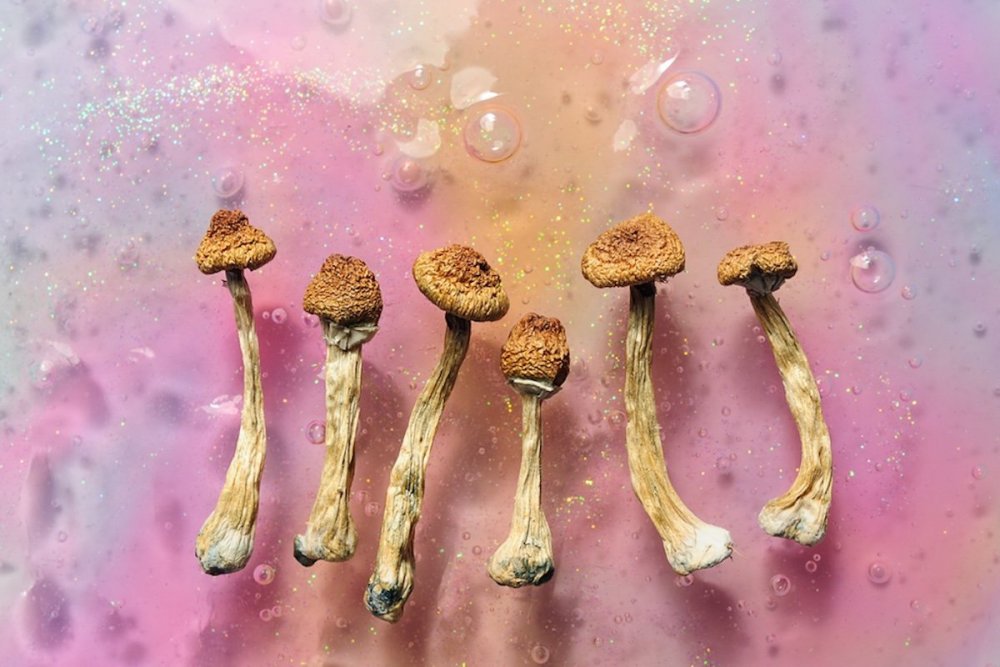The rise of psilocybin microdosing through “magic mushrooms” blends ancient wisdom with modern science. Rhianna Quanstrom explores the growing scientific research into mushroom microdosing and how they may improve mood, clarity, and creativity. Learn about the effects, benefits, and where they're legal.
The use of psychedelics for therapeutic purposes is on the rise. One of the main trailblazers in this frontier is psilocybin, commonly known as “magic mushrooms.” Scientific research is exploring the exciting possibility of using psilocybin as an effective treatment for psychological conditions, including depression, anxiety, PTSD, and addiction.
With psilocybin’s growing popularity, microdosing has entered the mainstream conversation. Many people are now exploring the potential healing benefits of taking mushrooms in tiny doses. Let's take a look at the science, benefits, risks, and legality of microdosing mushrooms. But first, let’s discuss what psilocybin and microdosing are.
What is Psilocybin?
Psilocybin is the active compound found in several mushrooms belonging to the Psilocybe genus. Psilocybin mushrooms, as well as other psychedelic mushroom species, have been used for thousands of years in shamanic cultures worldwide.
One of the most prominent historical records of its use comes from the Aztec and Maya cultures of Mesoamerica (Stamets, 1996). In these cultures, the psilocybin-containing mushrooms were considered sacred and were used in spiritual ceremonies for healing, divination, and divine communion.
 Psilocybin is the active compound found in "magic mushrooms"
Psilocybin is the active compound found in "magic mushrooms"
While psychedelic mushrooms are still used in sacred ceremonies and rituals by Indigenous Peoples of North and South America, they are more commonly known as a “party drug” in Western society. Of course, this has led to a widespread prejudice against mushroom use. However, this attitude is evolving with emerging research and anecdotal reports of psilocybin's transformative healing potential.
When ingested at a moderate-to-high dose, psilocybin alters consciousness and produces what is commonly known as a “trip.” In other words, journeyers may experience hallucinations, closed-eye visuals, deep introspection, emotional release, and spiritual insight.
One of the main reasons for psilocybin’s psychedelic effects is its interaction with the 5-HT2A serotonin receptor. This is the most widely expressed serotonin receptor in the body, and it modulates mood, perception, and cognition.
It is through this effect, as well as many others, that psilocybin improves mental well-being. While most studies examine psilocybin’s effects in moderate to large doses, there is a growing body of research dedicated to exploring the potential benefits of microdosing psilocybin.
What is Microdosing?
Microdosing involves taking a psychedelic substance at very low doses (about 1/10th of a normal dose) for a prolonged period of time. These doses are low enough that they do not produce a full psychedelic experience. Rather, they are more subtle and do not usually interfere with daily activities.
Why Do People Try Microdosing Mushrooms?
People often microdose mushrooms to receive their therapeutic benefits, as it’s believed that the benefits achieved at a full dose can also be experienced with consistent microdoses. The benefits of ingesting psilocybin are numerous, and many of these benefits result from how psilocybin interacts with the brain. One of the well-researched benefits is its ability to reduce depression in both the short and long term.
“The benefits of ingesting psilocybin are numerous. One of the well-researched benefits is its ability to reduce depression in both the short and long term.”
A 2025 report in the journal Neuropsychiatric Disease and Treatment explains how psilocybin binds to and activates serotonin receptors in the brain (much like typical antidepressant medications) while also lowering inflammation. Inflammation in the brain is linked to mental health conditions such as anxiety, depression, and PTSD. Because psilocybin increases serotonin activity (which helps regulate mood) and decreases inflammation, it may be highly beneficial for those experiencing depression.
Along with these effects, psilocybin also increases neuroplasticity and lowers activity in the default mode network (DMN). Neuroplasticity is the brain’s ability to form new neural pathways. We all have “mental grooves” that we “fall into” based on our childhood, societal conditioning, and psychological issues. In a sense, we are “programmed” to respond in specific ways to certain memories or triggers.
Because psilocybin enhances neuroplasticity, it facilitates the formation of new thought patterns and beliefs. In this way, it can be incredibly healing for trauma and PTSD, as it helps us face difficult memories and form new beliefs around them. This also relates to its ability to lower activity in the DMN.
MORE LIKE THIS:
- MDMA Microdosing: Is it Legal and What Are The Risks?
- What is Ego Death? Meaning, Symptoms, and Causes
- Microdosing 101: A Modern Phenomenon Rooted in Ancient Times
According to the study mentioned above, “the DMN is typically active when an individual is in a task-free, resting state; eg, during self-referential thinking, rumination, or daydreaming. Anxiety and depressive disorders are associated with abnormal activity of the DMN, which can lead to excessive rumination, negative thought patterns, and impaired emotional regulation…
The capacity of psilocybin to reduce excess activity in the DMN may be a significant mechanism whereby psilocybin exerts its long-lasting antidepressant action, allowing relief from negative thought patterns and emotional biases. Reduced DMN activity can result in profound alterations in consciousness and is likely responsible for the mystical-type experiences reported by Griffiths et al, with decreased self-other discrimination and even complete ego dissolution.”
Additionally, along with its ability to significantly improve anxiety and depression, many self-reports claim that microdosing psilocybin improves memory, mental clarity, focus, concentration, and creativity. As such, microdosing mushrooms may help people focus at work, be more present in conversations, and engage more deeply with creative projects.

People often try microdosing psilocybin to improve mental health issues
The main attraction to microdosing psilocybin is that it presents an easier way to receive its benefits without undergoing a full hallucinogenic journey. People can still live their normal lives while addressing underlying psychological and emotional patterns and improving mental focus and clarity. Furthermore, it is more economical and easier to obtain.
What Science Says: Mushroom Microdose
There’s no doubt that psilocybin in moderate to large doses is beneficial, but the science on microdosing mushrooms is still lacking. Many studies attribute the psychological benefits of microdosing psilocybin to a placebo effect.
For example, a self-blinding citizen science research report found “no significant differences between the placebo and microdose groups” and stated, “Our study validates the positive anecdotal reports about the psychological benefits of microdosing (significant improvements from baseline in a broad range of psychological measures); however, our results also suggest that these improvements are not due to the pharmacological action of microdosing, but are rather explained by the placebo effect (lack of significant between-groups differences).”
“Microdosing mushrooms may help people focus at work, be more present in conversations, and engage more deeply with creative projects.”
This is just one of many studies that come to a similar conclusion. However, a 2024 review from two Australia universities published in the Journal of Psychopharmacology claimed that the research is lacking, and that any conclusions that microdosing mushrooms is predominantly a placebo “are premature and possibly wrong.” The authors, Vince Polito and Paul Liknaitzky, evaluated all available and published research on microdosing psilocybin and LSD.
Based on their findings, they determined that microdosing does have a pharmacological effect. Specifically, microdosing produced neural changes in the brain, with increased neuroplasticity and decreased activity in the default mode network (DMN). They also found microdosing psilocybin (or LSD) increased pain tolerance, subtly altered consciousness, and had positive effects on mood.
MORE LIKE THIS:
- What is the Peyote Cactus and s it Legal?
- Psychedelic Integration: Honoring the Journey Beyond the Experience
- What is Huachuma, the San Pedro Cactus?
The main conclusion of the report is that current science is still limited. The authors state that more long-term studies with larger clinical populations are needed.
Additionally, in many of these research articles, psilocybin and LSD have essentially been categorized as the same substance. Furthermore, some of the psilocybin-specific studies used a synthetic version of the compound; to be clear, how a natural, non-isolated, or non-synthesized mushroom affects the body and brain is different from how LSD, an isolated extraction, or a synthetic version, will. 
More scientific evidence is needed into microdosing mushrooms
As such, the research remains inconclusive, and people’s personal experiences may still be the best source of understanding. One of the greatest challenges to studying the effects of microdosing is that the level of psilocybin in a mushroom depends on the species and how it’s grown. That makes controlled studies even more difficult, because you can have two mushrooms of the same species that differ in potency based on growing conditions.
Nevertheless, numerous firsthand reports praise the benefits of microdosing mushrooms. We’ll just have to wait for the science to catch up and (most likely) confirm what many people already know to be true: microdosing mushrooms improves mood, cognition, and overall well-being.
Possible Risks of Microdosing Psilocybin
Because there have not been any long-term studies on the effects of microdosing psilocybin, the possible risks are still unknown. There is some concern that microdosing mushrooms may negatively affect the cardiovascular system over time because of chronic serotonin activation.
“Many self-reports claim that microdosing psilocybin improves memory, mental clarity, focus, concentration, and creativity.”
According to a 2025 report published in the journal Neuropsychiatric Disease and Treatment, “Adverse side effects of microdosing psilocybin are uncommon and limited to short-term anxiety, impaired cognition, and physical discomfort. Psilocybin does not show evidence of addiction potential, and in fact is anti-addictive in that daily intake leads to loss of therapeutic benefits.”
Is Psilocybin Legal?
In the United States, psilocybin’s legal status depends on the state. At the federal level, psilocybin is classified as a Schedule I substance under the Controlled Substances Act. However, because of its therapeutic potential, the legal landscape is changing rapidly.
In some states, including Colorado, Oregon, and New Mexico, it is legal for supervised therapeutic use. In California and Washington, it has been decriminalized in several cities. It is also decriminalized in Ann Arbor, Michigan.
Across the globe, psilocybin’s legal status varies from legal to completely illegal to legal for medical treatment. The only countries where it is fully legal include Nepal, the Netherlands, Jamaica, Brazil, and the Bahamas (except for sale).
Takeaway: Microdosing Mushrooms
Psilocybin, or “magic mushrooms,” has been shown to significantly improve psychological and emotional well-being. It can potentially help treat depression, anxiety, PTSD, and chronic pain while improving cognitive function and neuroplasticity.
While the science around microdosing is limited and somewhat conflicting, hopefully the coming years will bring research that validates may of the positive personal experiences shared. In doing so, the legal status is likely to change so that more people have access to the healing benefits of microdosing mushrooms. ●
Images Cannabis_Pic, Cannabis_Pic, Cannabis_Pic
happiness.com | The fine art of being: learn, practise, share
Are you a happiness.com member yet? Sign up for free now to:
■ enjoy our happiness magazine with practical life tips
■ share and support in our happiness forum
Alternative medicine | Herbalism | CBD
Written by Rhianna Quanstrom
 Rhianna Quanstrom is a freelance writer, herbalist, and spiritual seeker with a passion for nature-based healing and sacred wisdom. Her writing draws from years of experience with meditation, shamanic practices, plant medicine, dream work, and the reclamation of the Sacred Feminine. Discover more of her writing and poetry on her Mystic Love Substack.
Rhianna Quanstrom is a freelance writer, herbalist, and spiritual seeker with a passion for nature-based healing and sacred wisdom. Her writing draws from years of experience with meditation, shamanic practices, plant medicine, dream work, and the reclamation of the Sacred Feminine. Discover more of her writing and poetry on her Mystic Love Substack.

Join the conversation
You are posting as a guest. If you have an account, sign in now to post with your account.
There are no comments to display.